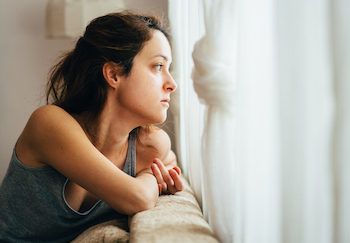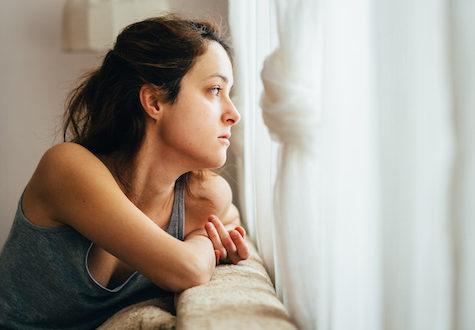
The good news: stay-at-home mandates in effect across the U.S. seem to be helping to limit the spread of COVID-19. The not-so-good news: Staying isolated at home is putting some people at greater risk for mental illness and domestic violence.
Thankfully, even in isolation, you don’t have to face these challenges alone. “One positive thing coming out of this experience is the surge in resources being offered and organized for the public,” says psychotherapist Jody Sweeney, LCSW. “We’re connecting as community members, medical providers, and mental health providers to address these issues together.”
Why Your Anxiety Is Increasing
As weeks of quarantine turn into months, it’s no surprise that anxiety is on the rise. You may be dealing with:
- Fear of getting the virus or spreading it
- The demands of home-schooling kids and working from home
- Financial strain
“This pandemic is different for everyone,” says Sweeney. “But we’re all dealing with some level of uncertainty, and we’re trying to adjust.”
Managing this new normal isn’t easy. When we’re isolated at home, we don’t have the routine, structure, and social support that we rely on for our mental health.
“Many people may be feeling a bit lost right now,” says patient advocate and counselor Arminda Perch, MPA, MSW. “That’s why it’s important, especially for those who are at higher risk or who have been diagnosed with depression, anxiety, or other mental health issues, to think about putting a support plan in place during this time.”
5 Tips to Reduce Anxiety and Depression
A support plan should include:
- Proactive steps you can take to maintain your emotional well-being
- Resources you can turn to for support and guidance
Sweeney and Perch offer some suggestions for finding peace in times of upheaval.
Hit Pause
Take a moment to reset with deep breathing, stretching, meditation, or just relaxing quietly. “These activities promote peace of body and peace of mind,” says Perch. “The more we engage in them, the more easily our bodies can respond to the pressures of this crisis.”
Unplug
Limit the amount of time you spend on social media and consuming news. Too much information can be overwhelming. When you do seek out information, be sure you’re turning to factual news sources, advises Sweeney.
Be Kind to Yourself
These are extraordinary times, so cut yourself some slack. “We are our own worst self critic, and this type of situation intensifies our tendency to criticize ourselves,” says Perch. “But we have to change our expectations of ourselves. You’re not going to do everything perfectly, so be kind and compassionate to yourself.”
Make Connections
Stay in touch with friends and family via phone or video chat to combat feelings of loneliness.
Volunteer
Doing something to help others – even a simple email to check on a loved one – helps give you a sense of purpose.
Take Care of Your Body
Do all of the things necessary to maintain your physical health, including getting enough sleep, eating right and exercise.
Especially at Risk: Victims of Domestic Abuse, LGBTQ Youth
Being stuck at home is not just emotionally challenging for some. It’s unsafe. “Isolation represents safety for many people,” says Perch. “But domestic abusers use isolation as a way to control, so the problem is exacerbated for victims.”
In a recent UVA Today article, Kathryn Laughon, a School of Nursing professor who studies intimate partner violence, says that it’s difficult to get a sense of how widespread the problem of domestic violence is in the middle of a pandemic. However, there’s every reason to believe that more people are at risk due to the stay-at-home mandate.
“Victims are isolated with their abusers, with even fewer safe places to go. Work, school, community centers – those might have been sanctuaries under normal conditions, but now they don’t have those anymore,” said Laughon.
Concerns for LGBTQ Youth
LGBTQ youth who aren’t accepted by their families or communities or haven’t come out are also at risk. They may be more likely to experience verbal and/or physical abuse.
Amy-Sarah Marshall, president of Charlottesville Pride Community Network, says that LGBTQ youth are already at increased risk of attempted suicide. “I’m concerned that, for those youth who aren’t accepted by their families, this quarantine may be particularly challenging and put them at greater risk for mental health issues,” she says.
Finding Safety and Support
If you’re at risk, a support plan for managing your emotional well-being must be coupled with a safety plan. Know who you can turn to and where you can go if your home is unsafe. Here are a few things to keep in mind:
- Shelters are open, including Shelter for Help in Emergency (SHE) in Charlottesville. However, it’s important to call ahead, as most are seeing victims by appointment only.
- Friends or family members may be your best option for shelter in case of an emergency. Communicate your concerns with people you trust. Make a list of those who could house you safely.
- Hotlines are open. Many have online chat lines or text capabilities to support victims who can’t make a call in private.
- Many groups are offering therapy and counseling sessions online. Some insurance companies are waiving their co-pays for these mental health services.
Feeling Anxious, Depressed or Overwhelmed?
Make an appointment with a UVA mental health provider.
Recommended Resources During Quarantine
The UVA Department of Population Health compiled a list of resources, including those highlighted here and many more:
For People In Crisis
- National Suicide Prevention Lifeline: 800.273.8255 (Hearing impaired: 800.799.4889)
Crisis Text Line: text HOME to 741741 to connect with a crisis counselor
Live chat services available through LifeLine - Substance Abuse and Mental Health Services Administration (SAMHSA) 24/7 Helpline: 800.985.5990 or text TalkWithUs to 66746
- 24-Hour Teen Crisis Hotline: 434.972.7233
- The Trevor Project (offers a 24-hour confidential crisis and suicide prevention helpline for lesbian, gay, bisexual, transgender and questioning youth): 866.488.7386
- The Steve Fund (connects young people of color to a trained crisis counselor 24/7): Text STEVE to 741741
- Veterans Crisis Line: 800-273-8255, Press 1
- Region Ten (providing 24/7 emergency services for those experiencing a mental health crisis): 434.972.1800
Mental Health Services
- On Our Own of Charlottesville (providing virtual support through Zoom and by phone)
- The Women’s Initiative (offering phone-in services): 434.872.0047
- HelpHappensHere (Community Health and Wellness Coalition, offering resources for the local community): 434.227.0641
- Counseling Alliance of Virginia (accepting new virtual clients): 434.220.0333
- Central Virginia Clinicians of Color Network Emotional Support Line (call and leave your name, phone and email; support sessions held Wednesdays from 5-8 p.m.): 434.218.0440
- UVA Behavioral Health (serving participants in UVA Health Hoos Well Advocacy and BeWell programs, Interactive Home Monitoring, UVA-Aetna Medicare Advantage and Bundled Payments for Care Improvement programs)
LGBTQ Community
- PFLAG Blue Ridge (providing virtual support group meetings)
- Side By Side Youth Support (offering online support groups and virtual social gatherings for LGBTQ youth)
- Trans Lifeline (phone hotline for and by trans people): 877.565.8860
Sobriety Support
- Substance Abuse & Addiction Recovery Alliance of Virginia (offering Zoom recovery meetings): 804.762.4445
- SMART Recovery Online Recovery Groups: 440.951.5357
- Culpeper Overdose Awareness (providing links to a variety of online resources)
